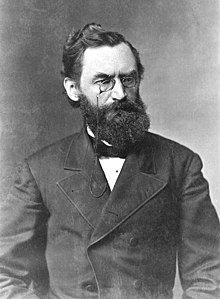
Back كارل شورتز Arabic كارل شورتز ARZ کارل شورتس AZB Carl Schurz Danish Carl Schurz German Carl Schurz Spanish کارل شورتس Persian Carl Schurz Finnish Carl Schurz French קארל שורץ HE
Carl Schurz | |
|---|---|
 Schurz photographed by Mathew Brady, c. 1877 | |
| 13th United States Secretary of the Interior | |
| In office March 12, 1877 – March 7, 1881 | |
| President | Rutherford B. Hayes |
| Preceded by | Zachariah Chandler |
| Succeeded by | Samuel J. Kirkwood |
| United States Senator from Missouri | |
| In office March 4, 1869 – March 3, 1875 | |
| Preceded by | John B. Henderson |
| Succeeded by | Francis Cockrell |
| United States Minister to Spain | |
| In office July 13, 1861 – December 18, 1861 | |
| President | Abraham Lincoln |
| Preceded by | William Preston |
| Succeeded by | Gustav Körner |
| Personal details | |
| Born | Carl Christian Schurz March 2, 1829 Liblar, Rhine Province, Kingdom of Prussia, German Confederation (now Erftstadt) |
| Died | May 14, 1906 (aged 77) New York City, U.S. |
| Political party | Republican |
| Other political affiliations | Liberal Republican (1870–1872) |
| Spouse | Margarethe Meyer |
| Education | University of Bonn (BA) |
| Signature |  |
| Military service | |
| Allegiance | German revolutionaries United States |
| Branch/service | United States Volunteers (Union Army) |
| Years of service | 1848 1862–1865 |
| Rank | Major general |
| Battles/wars | German revolutions of 1848–49 American Civil War (1861–1865) |
| This article is part of a series on |
| Liberalism in the United States |
|---|
 |
Carl Schurz (German: [ʃʊɐ̯ts]; March 2, 1829 – May 14, 1906) was a German revolutionary and an American statesman, journalist, and reformer. He migrated to the United States after the German revolutions of 1848–1849 and became a prominent member of the new Republican Party. After serving as a Union general in the American Civil War, he helped found the short-lived Liberal Republican Party and became a prominent advocate of civil service reform. Schurz represented Missouri in the United States Senate and was the 13th United States Secretary of the Interior.
Born in the Kingdom of Prussia's Rhine Province, Schurz fought for democratic reforms in the German revolutions of 1848–1849 as a member of the academic fraternity association Deutsche Burschenschaft.[1] After Prussia suppressed the revolution Schurz fled to France. When police forced him to leave France he migrated to London. Like many other "Forty-Eighters", he then migrated to the United States, settling in Watertown, Wisconsin, in 1852. After being admitted to the Wisconsin bar, he established a legal practice in Milwaukee, Wisconsin. He also became a strong advocate for the anti-slavery movement and joined the newly organized Republican Party, unsuccessfully running for Lieutenant Governor of Wisconsin. After briefly representing the United States as Minister (ambassador) to Spain, Schurz served as a general in the American Civil War, fighting in the Battle of Gettysburg and other major battles.
After the war, Schurz established a newspaper in St. Louis, Missouri, and won election to the U.S. Senate, becoming the first German-born American elected to that body.[2] Breaking with Republican President Ulysses S. Grant, Schurz helped establish the Liberal Republican Party. The party advocated civil service reform, sound money, low tariffs, low taxes, and an end to railroad grants, and opposed Grant's efforts to protect African-American civil rights in the Southern United States during Reconstruction. Schurz chaired the 1872 Liberal Republican convention, which nominated a ticket that unsuccessfully challenged President Grant in the 1872 presidential election. Schurz lost his own 1874 re-election bid and resumed his career as a newspaper editor. He was elected as a member to the American Philosophical Society in 1878.[3]
After Republican Rutherford B. Hayes won the 1876 presidential election, he appointed Schurz as his Secretary of the Interior. Schurz sought to make civil service based on merit rather than political and party connections and helped prevent the transfer of the Bureau of Indian Affairs to the War Department. Schurz moved to New York City after Hayes left office in 1881 and briefly served as the editor of the New York Evening Post and The Nation and later became the editorial writer for Harper's Weekly. He remained active in politics and led the "Mugwump" movement, which opposed nominating James G. Blaine in the 1884 presidential election. Schurz opposed William Jennings Bryan's bimetallism in the 1896 presidential election but supported Bryan's anti-imperialist campaign in the 1900 presidential election. Schurz died in New York City in 1906.
- ^ Dvorak, Helge (2002). "Schurz, Carl Christian". Biographisches Lexikon der Deutschen Burschenschaft (in German). Vol. Band I: Politiker Teilband 5: R-S. Heidelberg: Universitätsverlag C. Winter. pp. 372–376. ISBN 3-8253-1256-9.
- ^ "Schurz, Carl (1829-1906)". Wisconsin Historical Society. Archived from the original on 2013-10-30. Retrieved 2 November 2016.
- ^ "APS Member History". search.amphilsoc.org. Retrieved 2021-05-12.
© MMXXIII Rich X Search. We shall prevail. All rights reserved. Rich X Search